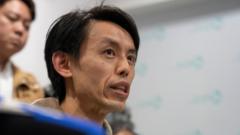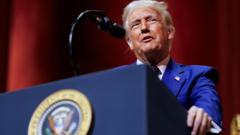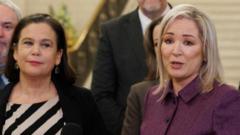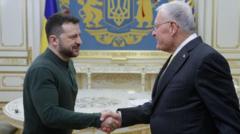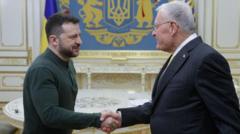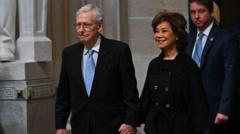Trump's assertions have been met with sharp criticism, particularly from Ukrainian President Volodymyr Zelensky, as they seem aligned with Russian narratives intended to undermine Ukraine's legitimacy. A fact-check by BBC Verify scrutinizes the accuracy of Trump's claims, revealing inconsistencies and a lack of solid evidence.
**Trump's Controversial Claims on Ukraine: A Fact-Check Analysis**
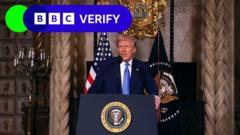
**Trump's Controversial Claims on Ukraine: A Fact-Check Analysis**
Former US President Donald Trump recently made contentious remarks regarding Ukraine's responsibility for the ongoing war with Russia, sparking a heated debate over the validity of his statements.
Trump accused Zelensky of being a "dictator without elections," pointing to the suspension of elections since the start of the Russian invasion in February 2022. However, this suspension is due to martial law that was enacted before Zelensky was elected. Despite challenges in conducting surveys amid a war, polling suggests Ukrainians still hold a majority of trust in Zelensky, contradicting Trump's assertion that his approval rating has plummeted to 4%.
Moreover, Trump sparked controversy by suggesting Ukraine initiated the conflict with Russia, despite the widely acknowledged fact that Russia launched its full-scale invasion in February 2022 after annexing Crimea in 2014. This manipulation of facts not only reflects Trump's tendency to echo Russian sentiments but also raises concerns regarding the ongoing narrative surrounding the war.
Zelensky's response highlighted Trump's adherence to "disinformation" propagated by Russia, emphasizing the importance of distinguishing verified information from misleading claims.
Trump's statements thus not only create a platform for misinformation but also have significant implications for Ukraine's diplomatic relationships and the international perception of the ongoing conflict.
Moreover, Trump sparked controversy by suggesting Ukraine initiated the conflict with Russia, despite the widely acknowledged fact that Russia launched its full-scale invasion in February 2022 after annexing Crimea in 2014. This manipulation of facts not only reflects Trump's tendency to echo Russian sentiments but also raises concerns regarding the ongoing narrative surrounding the war.
Zelensky's response highlighted Trump's adherence to "disinformation" propagated by Russia, emphasizing the importance of distinguishing verified information from misleading claims.
Trump's statements thus not only create a platform for misinformation but also have significant implications for Ukraine's diplomatic relationships and the international perception of the ongoing conflict.


